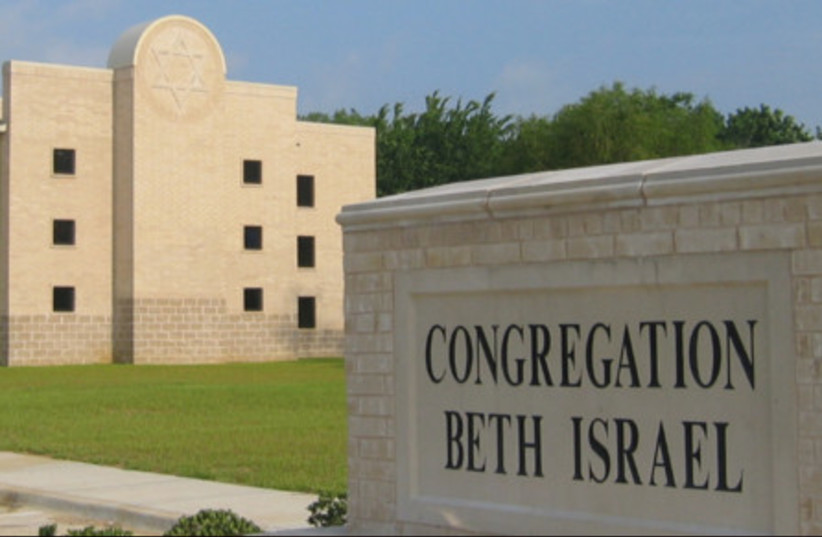January 15: Remembering the Colleyville, Texas synagogue hostage crisis - opinion

I urge you this Sabbath to heed the lessons of January 15 and the Holocaust that if Jews have survived the worst of humanity, they are also somehow capable of demonstrating the best of humanity.
Even in Texas, Saturday remains a day reserved for unordinary significance. And on this Sabbath last year, I could not rest but could only watch as my creation – Congregation Beth Israel of Colleyville, Texas – was violated by violence and the world’s chaos.
“[Jews] have experienced the worst of humanity... And we refuse, we refuse to give in to despair,” spoke Rabbi Charlie Cytron-Walker, when I proudly stood and observed him giving the candlelight blessing on the second night of Hanukkah at the White House, last month. As the daughter of two Holocaust survivors and the founder of the Congregation where Rabbi Charlie and three others were held hostage last January 15, I know only too well what he meant.
In the 10 concentration camps in which my father, George Salton, suffered, from the years 1939-1945, every moment could have been his last. He later told me that his survival had often depended on the compassion shared between his fellow prisoners in that earthly hell. My father’s life, indeed his very humanity, could be momentarily sustained by a caring gesture or glance from a friend.
When I speak with Cytron-Walker and my other Congregation Beth Israel friends about their miraculous survival during the 11-hour hostage crisis, I bear witness to this same humanity.
“I appear to be a happy and secure man, living the American dream... I married my lovely wife, we raised children, and were blessed with grandchildren,” my father wrote in The 23rd Psalm: A Holocaust Memoir that I co-authored with him and which was re-released, last year. “[But] beneath the thin veneer... ugly scars remain, ghosts hide and painful wounds fester.”
Antisemitism still festers in American society
What we learned in 2022 is that beneath the thin veneer of American society, the old and ugly hatred of antisemitism still festers like a painful wound that was waiting to be scratched.
My mission has now become meeting this antisemitism with all of the creativity, energy and resources I can summon as a Holocaust author and film producer. What I have discovered is that an equal and opposite force of love for the Jewish people exists in our world.
Neighbors, strangers, old acquaintances and new friends have extended their hands to me with the same warmth and compassion that sustained my father in his struggle. Churches, schools, community groups and even politicians are coming together in a united front to declare Jews are, as a matter of fact, actually people, too.
After the Holocaust, my father realized that he had another battle to fight: being accepted in public opinion. “After the war, when I came to America, people, good people, did not really want to talk about the Holocaust.”
HIS TESTIMONY would have to be expressed not in the stories he told about the Holocaust, but in the life that he led. He showed others what a Holocaust survivor was: decent, truthful, heroic, caring and brave. “If somebody, any person, has had some difficult and troublesome and frightening experience and looks for some lessons of hope, look to us,” George says in The 23rd Psalm. “Look to us.”
Show me a Jewish stereotype and I will show you my father, a human being, a mensch.
I know the minds and hearts of antisemites may be recalcitrant to change. The hatred is too old, the conspiracies too widespread and the prejudice too deeply rooted to go away with just wishful thinking. Too many of our cherished celebrities and historical figures were antisemites to dismiss Jew hatred as only a current fad among the young.
But as a licensed therapist, I also know that individual and collective healing from trauma takes time. And I know that antisemitism itself is a kind of collective trauma our civilization has held onto from Biblical times throughout history, filled with accusations, hatred and bloodshed. Given such a traumatic history, trust and relationships between Jews and non-Jews can simply break down.
I believe this is a crucial moment and I believe the lessons of January 15 and the Holocaust can help pave the way.
I urge you this Sabbath, while the year is still young and a fresh perspective still possible, to heed the lessons of January 15 and the Holocaust that if Jews have survived the worst of humanity, as Cytron-Walker so eloquently said, they are also somehow capable of demonstrating the best of humanity in those moments: through a gesture, a glance or an uplifting word. I look to my late father and the survivors of January 15 for these lessons of hope.
We should remember not only the tragedies they endured but cherish, in my father’s words, their love and goodness to one another as their brothers’ keepers when their lives depended on it. On this Anniversary Sabbath, let us instruct our fellow antisemites in our common humanity.
The writer is a Holocaust author, educator and film producer, who founded Congregation Beth Israel in Colleyville, Texas, and can be reached at annasaltoneisen@gmail.com.
Jerusalem Post Store
`; document.getElementById("linkPremium").innerHTML = cont; var divWithLink = document.getElementById("premium-link"); if (divWithLink !== null && divWithLink !== 'undefined') { divWithLink.style.border = "solid 1px #cb0f3e"; divWithLink.style.textAlign = "center"; divWithLink.style.marginBottom = "15px"; divWithLink.style.marginTop = "15px"; divWithLink.style.width = "100%"; divWithLink.style.backgroundColor = "#122952"; divWithLink.style.color = "#ffffff"; divWithLink.style.lineHeight = "1.5"; } } (function (v, i) { });

